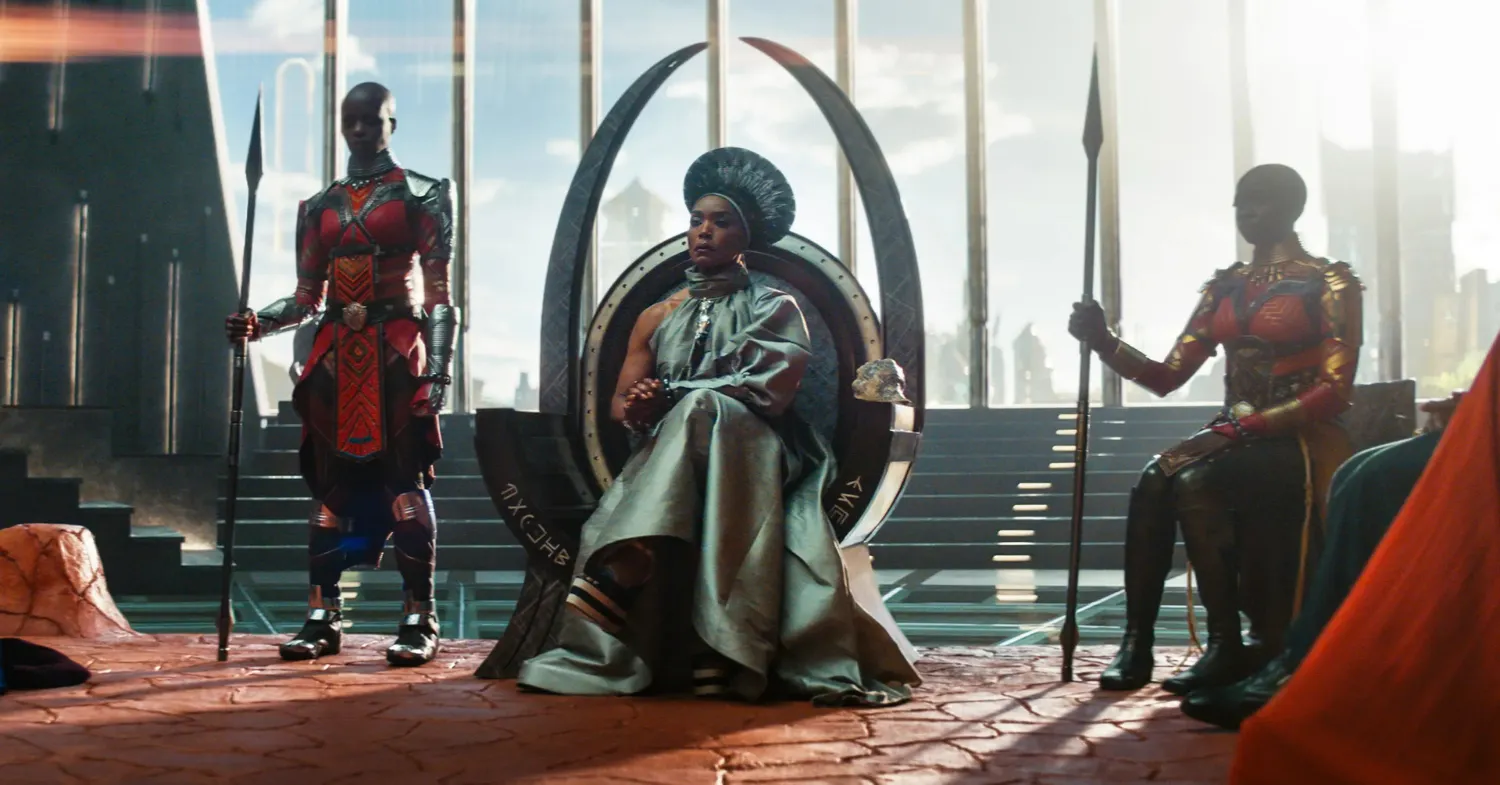Black Panther: Wakanda Forever has enough heart and emotion packed in for general audiences to be won over and enamored by.

The margin for error in Ryan Coogler’s sequel to 2018’s Black Panther was always going to be slim. He was tasked with delivering a film that matched the intensity and significance of its tight, universe-expanding first film that set the tables for one of Marvel’s most diverse storylines in a world dominated with white male superheroes doing battle with the most cosmic villains imaginable. Needless to say, there was a lot of pressure for Wakanda Forever to deliver on a monumental level.
Until its titular actor Chadwick Boseman’s shocking death in 2020, Black Panther was set to be one of the headlining figures moving into the next set of stories Marvel was planning to build well into the future. In turn, the movie (and the universe) had to perform a massive shift in storytelling and screenwriting to attempt to build from a massive fracture inside the country of Wakanda.
And in a way, Coogler and Marvel get it right with Black Panther: Wakanda Forever. It is not nearly as slick or buttoned up as its predecessor (as you can imagine), but it packs in a massive amount of heart and sincerity in its overly self-indulgent 162 minute(!) runtime. From the opening credits, it’s made clear that the cast and crew knew the emotional weight that returning to this story would induce. Chadwick Boseman’s legacy carries much of the weightier material Wakanda Forever has to offer within its script. Which begs the question: where was the weight supposed to lie before Boseman’s death?
Wakanda Forever is undoubtedly a messier film than the original Black Panther. But that’s also the state of Wakanda within its film as it tries to reconcile the death of its powerful and head-strong leader. The community must deal with a scattered succession plan, external pressures from countries scavenging the lands for the extremely powerful and scarce Vibranium, and an underwater empire threatening to wage war on the invasive land territories.
When putting it that way, perhaps Wakanda Forever is one of the first honest examples of a Marvel property best fit to be distributed as a long-running Disney+ miniseries. The film doesn’t hold back on premiering new superheroes, reintroducing familiar faces, and jumping from B-plot to B-plot. As you can imagine, these narratives don’t all intertwine into a fully cohesive and satisfying plot, but many do carry enough juice to be worthy of inclusion in such a landmark Marvel outing.
But there’s fluff, and frankly, its overwhelming at times how thin Marvel made the creatives stretch the story in Wakanda Forever. The inclusion of Dominique Thorne as Riri Williams, the young genius that eventually suits up as Ironheart in the film’s climactic third act war, felt like a clear script note handed down by the top dogs as an attempt to market future Disney+ entities (I know I should be used to this sort of hand-holding from Marvel studios at this point, I mean they did feel the need to use this exact tactic in both Thor: Love and Thunder and Dr Strange in the Multiverse of Madness).
It’s no insult to Thorne, who seems up to the challenge in carrying of one Marvel’s upcoming studio projects, but she’s in the wrong film. Her character offers much of the cheap comedy that comes underserved in any Marvel entity at this point – even if much of the slapstick humor here at least draws an occasional chuckle instead of an eye roll (I’m looking at you, Taika).
This same principle handholding Marvel execs use to continue character storylines is exhibited in the constantly dull and unnecessary confrontations between Julia Louis-Dreyfus’ Valentina and Martin Freeman’s Everett Ross. They might share the torch for the current MCU character “Audiences Least Care to See in the Credits” title. As with many MCU titles, a tighter runtime would’ve done Wakanda Forever wonders.
But it’s still good. In fact, it is leaps and bounds better than many of the recent superhero blockbusters jammed down the throats of viewers. Maybe that doesn’t justify giving Wakanda Forever favor, but at least it goes for something emotionally and stylistically. Letitia Wright carries this iteration of the Black Panther storyline with grace and the supporting citizens of Wakanda are as dynamic in this film as they are in the original.
And there’s Namor! It’s been duly noted that Tenoch Huerta’s portrayal of the Talokan emperor is one of the film’s brightest spots. It isn’t the cleanest introduction Marvel has had for an impactful, title card villain (much like Christian Bale, Huerta doesn’t get nearly enough screentime to garner cries from the rafters), but when he’s onscreen, he absolutely slays.
READ MORE MOVIE REVIEWS: She Said, Dual, Black Adam
It isn’t the leanest film Marvel has released in the last few years – the runtime is ambitious and I can’t quite say justified, but there’s clearly enough heart and emotion packed in for general audiences to be enamored by. The addition of Namor is excellent, and Tenoch Huerta gives one of Marvel’s best villainous performances yet. At times it can feel overstuffed, but I found enough meat to chew on as I left my screening.
Score: 6/10
Black Panther: Wakanda Forever (2022)
- Cast: Letitia Wright, Lupita Nyong’o, Danai Gurira, Winston Duke, Dominique Thorne, Tenoch Huerta Mejia, Angela Bassett, Martin Freeman, Julia Louis-Dreyfus
- Director: Ryan Coogler
- Genre: Action, Superhero
- Runtime: 162 minutes
- Rated: PG-13
- Release Date: November 11, 2022
More Reviews for Marvel Movies
Cinephile Corner has reviewed the following movies in the Marvel Cinematic Universe: